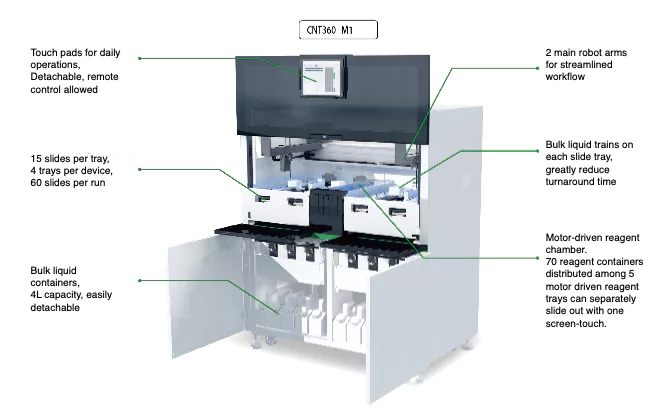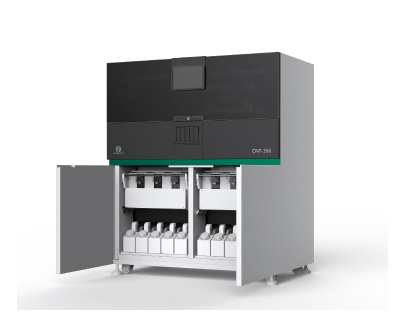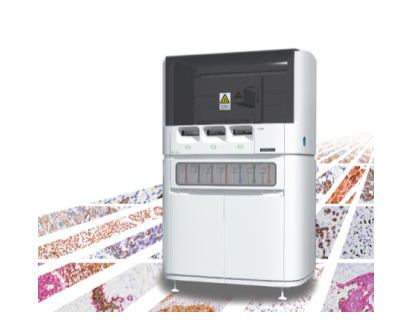Innovative Breakthroughs in Celnovte’s Full Automative IHC Stainer Technology Unveiled

By admin
Celnovte
About Celnovte
Celnovte stands as a leader in the realm of tissue diagnostics innovation. Committed to crafting advanced solutions, the company aims to boost laboratory efficiency, accuracy, and flexibility. Through a focus on automation and precision, Celnovte seeks to raise the bar in diagnostic technology, thereby aiding healthcare professionals across the globe.
CNT360 Full-automatic IHC&ISH Stainer
The CNT360 Full-automatic IHC&ISH Stainer is a highly advanced laboratory instrument designed for efficient and precise immunohistochemistry and in situ hybridization staining. Its intuitive software interface allows for seamless visual monitoring of reagent volume, running time, and fault messages, enhancing operational convenience. The stainer features waste separation, utilizing a non-toxic deparaffinization solution and separate containers for hazardous (DAB waste) and non-hazardous waste, thereby reducing the time and costs associated with waste disposal. With a customizable slide capacity of either 60 slides (M1 model) or 120 slides (M2 model), the CNT360 boasts a turnaround time of just 2.5 hours. Its robot design, comprising 2 to 4 main robot arms and 4 to 8 bulk liquid trains depending on the model, ensures precise and automated operation. Temperature control is meticulously maintained, with the reagent chamber kept between 14°C and 18°C, while the slide chamber can be adjusted between 25°C and 30°C for incubation, with the option to heat slides to 100°C for antigen retrieval. The dispense volume can be adjusted to 100ul, 120ul, or 150ul for optimal staining results.
The stainer accommodates reagent containers of 7ml and 30ml capacities, with 70 spots for M1 and 140 spots for M2 models. Bulk liquid containers hold up to 4L each, with 6 for the bulk liquid and 3 for non-hazardous waste, plus 1 for hazardous waste. The fluid probe is made of stainless steel, ensuring durability and reliability. Environmental requirements include an operating temperature range of 5°C to 35°C, with a maximum heating energy output of 2800VA. The CNT360 comes in dimensions of 1370mm x 820mm x 1600mm and weighs 400 kg for the M1 model and 800 kg for the M2 model.
CNT330 Full Automatic Multiplex IHC Stainer
The CNT330 Full Automatic Multiplex IHC Stainer is a revolutionary tool that revolutionizes IHC lab workflows. Capable of continuous operation, this advanced system effortlessly accommodates up to 30 slides across three independent frames simultaneously, streamlining the entire staining process from slice drying to deparaffination and antigen retrieval. The fully automated nature of the CNT330 not only enhances lab standardization and efficiency but also ensures precision and consistency in every step. With built-in monitoring capabilities, users can keep a close eye on dosage levels, timing, and any abnormal behavior throughout the staining process. Committed to sustainability, the CNT330 incorporates green design principles, featuring environmentally friendly solutions that help minimize hazardous waste treatment costs. Capable of processing up to 30 slides in just 2.5 to 4 hours, the CNT330 boasts 30 independent heating platforms that maintain optimal temperatures for optimal staining results. Additionally, users can customize reagent handling volumes to achieve precise staining quality, making the CNT330 an indispensable asset for any IHC laboratory.
Revolutionizing Tissue Diagnostics with Full Automative IHC Stainer Technology
Enhancing Workflow Efficiency
In the field of tissue diagnostics, optimizing workflows is crucial. Celnovte’s fully automated IHC stainer technology greatly improves laboratory efficiency by simplifying essential processes.
Seamless Integration with Laboratory Systems
One of the standout features of the full automative IHC stainer is its capability to seamlessly integrate with existing laboratory information systems (LIS). This integration facilitates the smooth transfer of data and minimizes manual input, thereby reducing potential errors and saving time. By synchronizing with LIS, laboratories can ensure data integrity and accelerate the diagnostic process.
Automated Sample Preparation and Processing
The automation of sample preparation and processing is a cornerstone of this innovative stainer technology. By automating these stages, laboratories can handle higher workloads with less manual intervention. The precise automation ensures that each sample is treated consistently, leading to more reliable and reproducible results. This level of efficiency is crucial for diagnostic accuracy and timely reporting.
Advancements in Staining Accuracy and Precision
Achieving high levels of staining accuracy and precision is essential in immunohistochemistry (IHC). Celnovte’s full automative IHC stainer brings notable advancements in this domain, ensuring unparalleled quality in diagnostic staining.
Precision-engineered Dispensing Mechanisms
The dispensing mechanisms of Celnovte’s stainer are designed with high accuracy, ensuring the precise and uniform application of reagents. This level of precision minimizes variability between samples and guarantees consistency across different batches. The technology’s capability to reliably control the volume and distribution of reagents is a significant advancement in attaining accurate staining results.
Reduced Variability and Enhanced Reproducibility
A significant challenge in IHC staining is the variability between different runs and operators. Celnovte’s full automative IHC stainer addresses this issue by providing a standardized and automated process, which greatly reduces human-induced variability. As a result, the reproducibility of diagnostic tests is significantly enhanced, leading to more reliable diagnostic outcomes and greater confidence in clinical results.
Cutting-edge Software and User Interface Design
The technological advancements of Celnovte’s stainer extend beyond hardware to include sophisticated software and user interface design, which together contribute to an efficient and user-friendly experience.
Intuitive User Experience
The user interface of the full automative IHC stainer is designed to be intuitive, making it accessible for laboratory technicians and pathologists alike. The software simplifies the workflow by providing clear instructions and real-time feedback on the staining process. This level of user-friendliness reduces the learning curve and enhances overall laboratory productivity.
Real-time Monitoring and Reporting Capabilities
Celnovte’s stainer incorporates real-time monitoring and reporting features, enabling continuous supervision of the staining process. This real-time functionality ensures that any potential problems can be identified and resolved quickly, thereby reducing downtime and preserving workflow continuity. Furthermore, automated reporting aids in quality control and documentation, which is crucial for regulatory compliance and audit preparedness.
Scalability of the Full Automative IHC Stainer
The scalability of Celnovte’s full automative IHC stainer ensures that it can meet the diverse needs of laboratories regardless of their size or workload demands.
Adaptability to Various Lab Sizes and Workloads
Celnovte’s stainer technology is adaptable, catering to the requirements of both small and large laboratories. Whether handling a few samples per day or managing hundreds, the full automative IHC stainer can efficiently accommodate varying volumes. This adaptability makes it an ideal choice for institutions looking to scale their operations without compromising on quality or efficiency.
Future-proof Design with Upgrade Capabilities
The design of the full automative IHC stainer includes provisions for future upgrades, ensuring long-term usability and relevance. As new technologies and reagents are developed, Celnovte’s stainer can be updated to incorporate these advancements. This future-proof approach mitigates the risk of obsolescence and ensures that laboratories can continue to deliver cutting-edge diagnostics.
Practical Implications for Pathologists and Researchers
Broader Range of Antibodies and Biomarkers Compatibility
Expanded Catalog of Validated Antibodies
A significant practical benefit of employing the full automative IHC stainer is its compatibility with a broader range of antibodies and biomarkers. Celnovte has meticulously expanded its catalog to include over 460 primary antibodies, which are rigorously validated to ensure reliability across various diagnostic applications. This extensive selection means that pathologists can rely on the full automative IHC stainer to address a wide spectrum of diagnostic requirements, enhancing the ability to detect and characterize various disease states accurately.
Versatility in Biomarker Detection
The fully automated IHC stainer also excels in its versatility for biomarker detection. It supports advanced technologies such as chromogenic in situ hybridization (CISH) and multi-color immunohistochemistry, enabling the simultaneous observation of multiple antigen targets on a single slide. This multifaceted approach enhances the precision of spatial analysis and improves the detection rates of tumor microinfiltration. Such versatility is particularly advantageous in complex diagnostic scenarios where comprehensive biomarker profiling is necessary.
Supporting Research Innovation and Development
Facilitating Advanced Studies
Celnovte’s full automative IHC stainer is not only a stalwart in clinical diagnostics but also a powerful enabler of research innovation. By providing consistent and high-quality staining results, researchers can explore new biomarkers and further understand disease mechanisms with greater confidence. The stainer’s ability to streamline long and complex experimental protocols makes it an invaluable tool for conducting advanced studies that require detailed and reproducible staining outputs.
Streamlining Complex Experimental Protocols
Another crucial aspect of the full automative IHC stainer is its capability to streamline complex experimental protocols. The automation of these protocols reduces the workload on laboratory personnel and minimizes the risk of human error. This setup is particularly beneficial for researchers who need to conduct high-throughput experiments that involve intricate antibody panel designs and precise condition control. By simplifying these processes, the stainer facilitates more effective and efficient research workflows, accelerating the pace of scientific discovery and innovation.
Summary
In summary, the full automative IHC stainer developed by Celnovte represents a landmark in the field of tissue diagnostics and research. By enhancing workflow efficiency through seamless LIS integration and automated sample processing, the stainer significantly improves laboratory productivity. Its precision-engineered mechanisms ensure accurate reagent dispensing, reducing variability and enhancing reproducibility in staining outcomes. The user-friendly interface and real-time monitoring capabilities further contribute to an optimized laboratory experience.
Moreover, the stainer’s scalability and adaptability make it appropriate for various laboratory sizes and diagnostic volumes, ensuring long-term usability and relevance through upgrade capabilities. Additionally, Celnovte’s emphasis on expanding antibody catalogs and supporting versatile biomarker detection enhances the stainer’s practical applications for pathologists. For researchers, the stainer’s ability to facilitate advanced studies and streamline complex protocols is invaluable, fostering innovation and development in medical research.
By embracing these innovative advancements, laboratories can achieve higher standards of diagnostic precision, streamline research processes, and ultimately improve patient outcomes. Celnovte’s commitment to pushing the boundaries of diagnostic technology cements its role as a vital partner in the ongoing evolution of medical science and healthcare.










